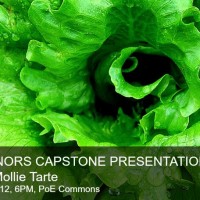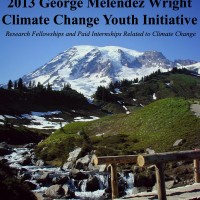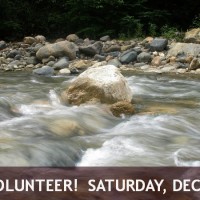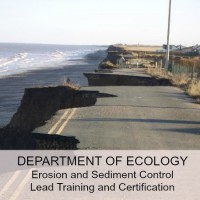Come and listen to Mollie Tarte, a graduating PoE Senior, talk about her experiences with the P-Patch and her ideas surrounding community urban gardens.
UW College on the Environment is now accepting proposals and applications for the 2013 George Melendez Wright Climate Change Youth Initiative (CCYI).
Look at the descriptions of each position below, or visit ccyi.org for more information.
Research Fellowships [Deadline January 18th, 2012 at 5:00PM]
Graduate fellowships support new and innovative research relevant to managing climate change impacts in US National Parks, including transboundary issues and comparisons to Mexican or Canadian protected areas. Awards will be made in the range of $5,000 – $20,000 for research undertaken in calendar years 2013-14.
Projects must be empirical; theoretical research and model development will not be supported. Relevant projects in any field of the natural, social, and cultural/historical sciences may be funded. Proposed research must be conducted in or around National Parks and must be relevant to NPS management needs. Upon completion of the fellowship, students are required to provide a summary report of their results and one or more educational products or publications meant for a broader audience.
Students enrolled in Masters and PhD programs in the US, Canada, and Mexico may apply. Both U.S. citizens and non-citizens are eligible. All applicants will be notified of selection decisions in April, 2013.
Paid Internships [Deadline January 21, 2013]
Internships enable students to gain practical experience in diverse fields related to climate change response, to explore career interests, and to build professional networks. This year 15 internship positions are offered in National Parks, NPS offices, and technical centers throughout the continental US, Alaska, and Hawaii. These diverse positions include fieldbased research and monitoring of climate change impacts; development of interpretive, educational, and staff-training programs; analyses of carbon footprints; web-based communication; and community engagement in science. Locations include urban historic parks, national program offices, and remote wilderness. All positions pay wages of $12/hour and last about 12 weeks. Most occur during the summer, though some include the spring or fall. Most include housing at little or no cost to the student. All positions for 2013 are described at ccyi.org. Applicants must be current undergraduate or first-year graduate students in a US university, or be in the process of applying to a graduate program at a US university.
Network for Business Innovation & Sustainability (NBIS) is seeking highly motivated students and professionals with strong writing and communications skills, as well as program planning and management experience.
With this, NBIS is offering the following internship opportunities:
- NBIS non-Profit Leadership Internship
- Program/Event Planning Marketing & Communications
- By-Product Synergy NW: Pioneering innovation, economic development, and waste reduction strategies for the Puget Sound region
- Administrative/Personal Assistant- Program Intern
These are unpaid internships offering students an opportunity to hone their organizational and project management skills in a business-focused environment. A minimum three-month commitment is required.
Winterthur Museum, Garden, & Library is offering a Research Fellowship Program for 2013–14. The program includes short- and long-term fellowships for graduate students to support research in material culture, architecture, decorative arts, design, consumer culture, garden and landscape studies, Shaker studies, travel and tourism, the Atlantic World, childhood, literary culture, and many other areas of social and cultural history.
For more information, Visit the Simpson Center for the Humanities
Submission/Application Deadline: Tuesday, January 15, 2013
ENVIR 480: Sustainability Studio students take on the sustainability of UW Laboratories!
Did you know laboratories use 5 to 10 times more energy per square foot than an average office building? Labs also use a lot of water and generate (literally) tons of waste. Meanwhile, lab facilities make up about 13% of square feet at UW- altogether almost 2.4 million square feet.
Save the date for THIS THURSDAY for the presentations about student-led projects to foster Green Laboratories at UW:
December 6th, 11:00am-12:00pm, followed by a short reception.
- Poplar Hall Commons, corner of Brooklyn Ave and NE Campus Parkway (and home to a Sustainable Living Community).
- Topics include: Green Purchasing, Waste, Sink Aerators and Growth Chambers, and Energy Use.
- Clients include: various UW labs, Environmental Stewardship and Sustainability Office, UW Facilities, Purchasing and Procurement and more.
The student projects are a springboard to a formal UW Green Labs program, being launched by the Environmental Stewardship and Sustainability Office.
Hope to see you there!
Looking for an interesting course to take this winter? Do you care about the environment and ever wonder why we ought to protect it?
Envir/Phil 243: Introduction to Environmental Ethics! Tuesday/Thursday from 10:00-11:20AM Discussion sections on Wednesdays and Fridays.
In this course students explore the field of environmental ethics by bringing philosophical inquiry to bear on environmental issues. We will learn about various theories in environmental ethics as well as how to apply philosophical skills and concepts to environmental challenges. This will include learning about theories such as the Land Ethic, Biocentric Individualism, Deep Ecology, and Ecofeminism. It will also include thinking critically about the ethical dimensions of environmental issues such as those facing the Puget Sound region and the global challenges of climate change. This course will provide a foundation for thinking about and recognizing the ethical dimensions of a wide range of issues in environmental studies. We will discover that environmental ethics is relevant to virtually every environmental issue.
The course has an optional service-learning component. Students who choose to engage in a service-learning project will write a final paper reflecting on the connection between their project and the course instead of taking the final exam.
Please contact the instructor, Lauren Hartzell Nichols, with any questions: greenphd@uw.edu
Come out for the PoE Community Holiday Party!
Tuesday, December 4 from 6:30-9pm
PoE Commons, Wallace Hall
There will be food, fun, and PoE friends adorned in ugly sweaters! If you can and would like to bring something for the potluck, feel free. If not, just join the fun and wear the tackiest holiday sweater you can find!
Join Friends of the Cedar River Watershed to plant native trees and shrubs on the Cedar River THIS Saturday, December 1 ~ 10:00am–2:00pm. C’mon out for a day of planting trees at King County Parks’ Cedar Grove Natural Area! The Cedar River is a valuable resource for our community; its headwaters are in an ecological forest preserve that provides clean drinking water for over one million residents, it supports numerous recreational activities, and federally-listed threatened salmon populations. Gather up your friends and restore some habitat! RSVP with Amy today.
The Centers for Disease Control and Prevention’s National Center for Environmental Health and the Agency for Toxic Substances and Disease Registry (NCEH/ATSDR) are offering a paid 10-week summer internship program for students who are passionate about the environment, interested in human health, and curious about how they are linked. During the course of the internship, students are introduced to environmental health at the federal level through collaborative projects, experiential learning opportunities, environmental health presentations, journal clubs, field trips, brown bag lunches, and mentoring relationships at NCEH/ATSDR. Interns will be based at NCEH/ATSDR’s Chamblee Campus and will be paid a stipend of approximately $600 a week during the course of the program.
Application due date: January 30, 2013
Program dates: June 12 – August 16, 2013









